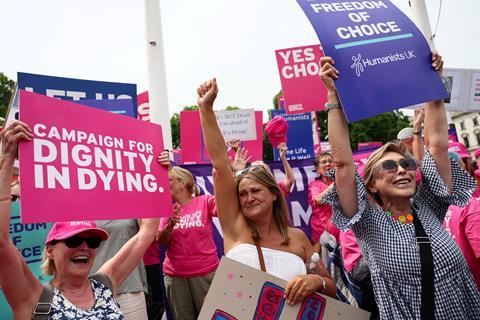Voting for assisted suicide prioritises personal choice over the collective good, says Peter Ladd. And in doing so, we have rejected God’s call to see the inherent dignity and worth in every human being. We have failed the vulnerable and the most needy

Today, the House of Commons voted to approve the Terminally Ill Adults (End of Life) Bill by a margin of 314-291. The Bill will allow anyone over the age of 18 who has received a terminal diagnosis of six months or less and who has mental capacity, to be prescribed lethal drugs to end their lives.
It now passes to the House of Lords and is likely to receive Royal Assent in the next few months. Assisted suicide could become an available service on the NHS in 2029.
The problems with the Bill are well-documented. The Royal College of Psychiatrists and the Royal College of Physicians publicly opposed it. Disability rights groups warned that disabled people might feel pressured. Experts in eating disorders warned that people would be at “grave risk”.
Amendments to protect people with Down’s Syndrome were rejected. Others which would have forbidden assisted suicide when people felt like a burden were voted down. Speeches warning of coercion, inequalities in palliative care, the impact on the poorest and the most vulnerable, were all heard…and ignored.
Following on from the vote to decriminalise abortion earlier in the week - which means that a woman will not be prosecuted for obtaining an abortion at any time, for any reason, all the way up to 39 weeks, after a debate which lasted just 46 minutes - it has been a bleak week for Britain.
Autonomy as god
This week, perhaps more than any other, sums up the post-Christian world in which we live.
The American writer David Foster Wallace once commented: “In the day-to-day trenches of adult life, there is actually no such thing as atheism. There is no such thing as not worshipping. Everybody worships. The only choice we get is what to worship.”
In Britain, we have chosen to worship ourselves. My body, my choice.
It’s the same decision humans made in the garden of Eden when God told Adam and Eve that they could eat fruit from any tree but one. We make ourselves into gods and hang the consequences.
Assisted Suicide rejects a worldview in which everyone is made in God’s image, of inherent dignity and worth
Autonomy is held up by our society not just as one among many virtues, to be balanced alongside others such as the needs of the community or protecting the vulnerable, but as the ultimate virtue. It says: “I am the master of my fate, I am the captain of my soul.”
This is just the latest example. The sexual revolution. The gender debate. Abortion on demand. And now assisted suicide. In doing so, as a nation, we have sacrificed those who are most in need on the altar of personal choice.
Ultimately, God gives us over to our desires. The brutal, hard-hitting truth about democracy is that, more than other political system, it reflects the values of the society it represents.
The myth of progress
It is one of many horrible ironies that assisted suicide is being held up as the latest example of a progressive society. It was a point that Labour MP, Jess Phillips, made a few months ago. She said in support of the Bill: “The NHS is not in a fit enough state…but you cannot stop progress happening.”
This is the myth of progress; that the latest cause always takes us forward, that humanity is always getting better, that we are superior to previous generations and are walking towards some suffering-free utopia.The myth should have been exploded by the 20th century; eugenics, fascism, labour camps and war.
In Britain, we have chosen to worship ourselves. My body, my choice
Assisted suicide rejects a worldview in which everyone is made in God’s image, and therefore of inherent dignity and worth. It returns us to a society in which the lives of disabled people are seen as second-rate, where those with Down’s Syndrome are seen as undesirable, and where we live by the survival of the fittest.
Matthew Parris wrote for The Times last year: “‘Your time is up’ will never be an order, but — yes, the objectors are right — may one day be the kind of unspoken hint that everybody understands. And that’s a good thing.”
Progress? If it is, it’s towards a dystopia.
The priority of the vulnerable
Today is a sad day: a day for lament and grief. A rubicon has indeed been crossed.
But it does not mark the end of our work to protect the vulnerable.
MP after MP spoke in the debate about the dearth of funding for high-quality palliative care in this country.
Former prime minister, Gordon Brown, wrote this week in The Guardian: “There is no effective freedom to choose if the alternative option, the freedom to draw on high-quality end-of-life care, is not available.”
The All-Party Parliamentary Group on Hospice and End of Life Care wrote in a report in January 2024 that NHS commissioning of hospice services is “currently not fit for purpose”.
They also described a “postcode lottery”. There are more than 220 hospices in the UK, and they receive more money from the charity sector than they do from the government. In more economically-deprived areas, people were less likely to be able to donate to their local hospice. Such inequality among those who are most vulnerable is a tragic commentary on our society.
At CARE, we will be calling for proper investment in high-quality palliative care, which recognises the inherent value of the individual. Alleviating suffering and showing compassion matter. There will always be hard cases in a fallen world where disease and sickness exist. But we want to show the love of God as best we can by caring and supporting people at the very end of their lives.
Dame Cicely Saunders, the Christian palliative care pioneer, once said: “We will do all we can not only to help you die peacefully, but also to live until you die.”
That really would be progress.






































1 Reader's comment